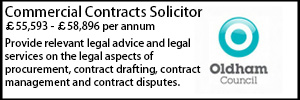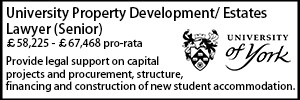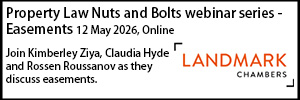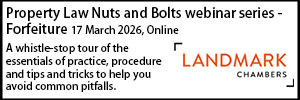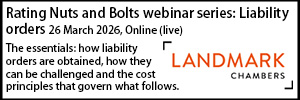London borough wins High Court battle over community centre ownership
- Details
Brent Council has won a High Court dispute over the ownership of a community centre site and secured an injunction restraining the defendants from making any applications to register a restriction against the property.
The case of London Borough of Brent v Johnson & Ors [2020] EWHC 2526 (Ch) concerned the Bridge Park Community Centre, which Mr Michael Green QC, sitting as a Deputy Judge of the Chancery Division, described as "a remarkable concept".
The community centre was the brainchild of Mr Leonard Johnson, the First Defendant, and the organisation that he founded, the Harlesden Peoples Community Council (HPCC).
The vision in 1981 had been to establish a centre in the London Borough of Brent that was owned and managed by the local black community for themselves. It was intended to empower that community and would prevent unrest, principally by its disaffected youth, from becoming violent, leading to riots similar to those that had taken place in Brixton and Toxteth at that time.
Brent was the most ethnically diverse borough in the country and it was feared that there would be similar riots to those that had taken place elsewhere. “But Mr Johnson and the creation of Bridge Park were a massive factor in ensuring that Brent did not suffer in the same way,” the judge said.
Bridge Park was an old LTE Bus Depot and Mr Johnson and HPCC identified the site and “determinedly pursued its acquisition as a place where they could realise their philosophy of providing a space where the local community could establish themselves and grow and succeed by their own efforts, without interference from outside”.
However, as a fledgling organisation without any financial resources, HPCC was in no position to purchase the site.
They had to involve the council, together with central government and the GLC in order for there to be any chance of the site being acquired. Brent acquired the site from LTE on 5 May 1982 for £1.8m and legal title was transferred into the local authority’s name.
The purchase consideration was made up by a number of grants from the DofE and the GLC, with the balance, an agreed amount of £834,500, being paid by Brent itself.
The defendants argued that the grant monies were only obtained because of the involvement of HPCC and were earmarked for the project and so should be considered to be contributions to the purchase price made by HPCC.
“In other words, they say that a substantial part of the purchase price was paid by or on behalf of HPCC and that therefore Brent held Bridge Park on resulting trust for HPCC in proportion to its contribution,” the judge said.
The defendants alternatively claimed beneficial interests in Bridge Park on the basis of constructive trust, proprietary and promissory estoppel and/or estoppel by convention. They also maintained that Bridge Park was bought for charitable purposes and had always therefore been held by Brent on a charitable trust.
Judge Green said the reason why the defendants were maintaining these claims against Brent's title to Bridge Park was because they objected to what Brent wished now to do with the site.
After successfully developing and operating Bridge Park through a steering group company during the 1980s, the early 1990s saw the beginning of its demise. Whilst the reasons for this were contested, possession proceedings were commenced by Brent in 1992 and by 1995 Brent had taken over control of Bridge Park and it was managed directly by Brent since then. Over the years it had fallen into disrepair and it was proving very expensive for the council to run.
Brent had therefore sought to formulate plans as to what to do with the site. Following a local consultation in 2013 at which various options were put to the local community, Brent decided to pursue the possibility of building a newly enhanced leisure and community facility that would incorporate a swimming pool. However, in order to fund this redevelopment, Brent decided to sell part of the site to an adjoining landowner, GMH, and entered into a conditional land sale agreement on 14 June 2017.
The defendants did not wish to see the site, acquired as they saw it through their efforts and for the fulfilment of the project, sold off and for Brent to be able to "profit" from Bridge Park.
Brent denied that it would profit from the sale and said that it was necessary to sell part of the site in order to be able to fund the newly enhanced leisure facility which would be for the benefit of the whole of the local community, including HPCC.
On 18 August 2017, Mr Johnson made an application for a restriction to be entered against Brent's title to Bridge Park and it was that application that had led to the legal proceedings in which Brent sought a declaration that it was the sole legal and beneficial owner of Bridge Park.
Judge Green said that it became clear, during the hearing of the case, that there had been some confusion as to what was meant by "ownership".
He said that after hearing the defendants' witnesses in particular, it seemed to him that the ownership they envisaged, before the acquisition of the property, was more related to the project, to their vision and to the concept, rather than actual legal ownership of the property itself.
The judge added that he did not believe that the defendants, or anyone, truly believed that they owned the property in a legal sense; nor that that was essential in order to realise the concept of a community devised and managed centre that they hoped one day to own in its entirety.
Judge Green also noted that the defendants' defence had changed markedly during the trial and it had eventually led to an application during closing submissions to re-re-amend the defence.
The core change was a move away from the defendants' central allegation that representations were made by Brent before the property was acquired that the freehold would be transferred to HPCC or the steering group company.
Instead, the defendants wished to allege that what was represented at that time by Brent was that HPCC, or a community co-operative to be set up by HPCC, would be granted a lease of the property which would contain an option to acquire the freehold from Brent.
Judge Green ruled, however, in favour of Brent. He made the declaration sought by the council that it was the sole legal and beneficial owner of the property.
He also issued an amended injunction, saying that the he did “not have sufficient confidence that, without the injunction being in place, there will not be further attempts to stymie the sale on what would now be clearly misconceived grounds”.
The judge ended the judgment as follows:
308. I do not want to end this judgment on that note. While I have been somewhat critical of the Defendants' strategy of opposition to Brent's proposals in relation to Bridge Park, I am saddened that it has been necessary for this dispute to be determined by me in a long judgment that deals with the legal position in relation to the ownership of Bridge Park. The fact that I am delivering this judgment means that the mediation and settlement talks have failed to reach an outcome satisfactory to both parties. As I said at the beginning of this judgment, a trial of the issues before me is not the way to resolve the real issues between the parties. This dispute has come to a head in the context of understandably heightened tensions within the black community and the important focus on the Black Lives Matter movement. While the parties may be able to take such matters into account in seeking to resolve their differences out of court, I cannot do so. I had to decide the case on the facts surrounding the acquisition nearly 40 years ago and the law.
309. I totally understand that Bridge Park was Mr Johnson's conception and that the critical aspect of it, if it was to work and the riots were to be avoided, was that it would be run and managed by the local community for the local community without any direct involvement of Brent. Brent understood this, as did central government and the GLC, and they all shared Mr Johnson's and HPCC's philosophy. Everyone wanted it to succeed in that way as the stakes were so high. And, for a time, it did succeed. But the failure to set up a community co-operative or to agree the terms of a lease to the Steering Group Company, then the break-down of relations between HPCC and Brent leading to Brent's repossession of Bridge Park and, for the last 25 years, HPCC being completely uninvolved in its management, all undermine HPCC's claims to a beneficial interest. Those facts also confirm that the absence of any reference in any of the documentation to Brent holding the Property on trust whether for charitable purposes or HPCC or anyone was deliberate, reflecting the understanding of the parties that Brent did not hold the Property on trust. Instead the Property was held beneficially by Brent for its statutory purposes which are essentially to act in the best interests of the community, as I believe Brent is striving to do with its proposals for Bridge Park. Mr Gutch, the Defendants' witness, admitted that "at the end of the day, the asset was Brent's" even if it was acquired so as to be run by the community and even if the community aspired at some stage to own it.
310. It is obvious that something needs to be done to Bridge Park. Brent cannot just allow it to languish and be of diminishing use to the community. Brent has to respond to the current needs of the community but says it can only provide a newly enhanced leisure and community facility if it sells off part of the Property. It is not right, in my view, for Mr Johnson and HPCC to claim a veto on anything that Brent may wish to do with the Property based on an inaccurate recollection of what was said at the time of the acquisition. All of Brent's witnesses paid glowing tributes to Mr Johnson and the tremendous achievements of HPCC. I do too. But now that the legal issues have been resolved in my judgment, I would again urge the parties to move on and seek to achieve, by mutual co-operation and agreement, the best outcome for Bridge Park and the local community.
Sponsored articles
Walker Morris supports Tower Hamlets Council in first known Remediation Contribution Order application issued by local authority
Unlocking legal talent
Senior Solicitor - Property
Legal Officer
Legal Director - Government and Public Sector
Locums
Poll












